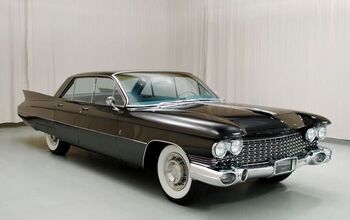Gran Torino: Dan Neil Nails It
There’s a reason why the Pulitzer Prize committee gave Dan Neil kudos, and it ain’t ’cause his hair stylist saw Eraserhead a few times too many. The LA Times carmudgeon’s eco-friendly posture can be a bit of a bore. And there are times when Neil geeks out but good. But there are columns where Neil drops it like he’s hot. His commentary on the symbolism of the 1972 Gran Turino in the movie Gran Torino is a prose poem that will, Samuel Johnson-like, stand the test of time (unlike the POS upon which the column and movie are based). “1972 was in many ways an inflection point for the U.S. automakers, the year that Detroit’s mighty cylinders began to seize. The Big Three would never again be as comfortable, and arrogant, and solipsistic, as they were then. The following year’s OPEC oil embargo sent them reeling. It was this generation of cars, which almost seemed to radiate contempt for their buyers, that drove Americans into the embrace of Japanese automakers when they came. It was this generation of carmakers, and indeed the one that came after, that failed to answer the challenges of an increasingly competitive global market. That failure took Detroit — a once-beautiful city of broad avenues and majestic public spaces — straight to hell.” Make the jump for Neil’s Talking Heads-style conclusion.
“So to say Walt Kowalski’s Gran Torino is a cinematic metaphor doesn’t really do it justice. The car — to whatever extent it is fractionally responsible for Detroit’s undoing — is an agent of the film’s action, a prime mover, an original sin. And Walt, a retired Ford autoworker, is an original sinner. One day in 1972 Walt is wrenching away on a Ford assembly line, stuffing a steering box into a shiny Gran Torino before going home to a comfortable middle-class home on a quiet street in Highland Park. Thirty-six years later, he raises the blinds of that same house to discover the world he knew is gone. The jobs have vanished, the factories closed, the prosperity replaced with desperation. How did he get here?”
More by Robert Farago
Latest Car Reviews
Read moreLatest Product Reviews
Read moreRecent Comments
- Mike Beranek In the sedan game, it's now either Camry or Accord. The rest are just background noise.
- Theflyersfan I know their quality score hovers in the Tata range, but of all of the Land Rovers out there, this is the one I'd buy in a nanosecond, if I was in the market for an $80,000 SUV. The looks grew on me when I saw them in person, and maybe it's like the Bronco where the image it presents is of the "you're on safari banging around the bush" look. Granted, 99% of these will never go on anything tougher than a gravel parking lot, but if you wanted to beat one up, it'll take it. Until the first warning light.
- Theflyersfan $125,000 for a special M4. Convinced this car exists solely for press fleets. Bound to be one of those cars that gets every YouTube reviewer, remaining car magazine writer, and car site frothing about it for 2-3 weeks, and then it fades into nothingness. But hopefully they make that color widespread, except on the 7-series. The 7-series doesn't deserve nice things until it looks better.
- Master Baiter I thought we wanted high oil prices to reduce consumption, to save the planet from climate change. Make up your minds, Democrats.
- Teddyc73 Oh look dull grey with black wheels. How original.

































Comments
Join the conversation
What changed in this country? People didn't change. The law changed. More particularly, the laws regarding trade changed. By modern standards, Americans had a miserable standard of living in 1955... but virtually everything they touched had been made in the United States by Americans earning a living wage. The American family of 1965 may have only had one car, one television, and a limited number of clothing and toys, but those purchases stayed in the economy. The "economic boom" of the fiat-money era (small "F") was a direct result of currency valuation, and it was prolonged by China's understanding that they could build their manufacturing base by undercutting ours. Manufacturing jobs will return once the dollar doesn't buy anything overseas. That day is coming.
wtf, '72 Torinos were great. It started going downhill in '73.